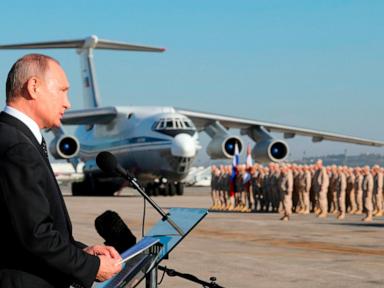Look out, Putin — Assad’s fall shows autocrats aren’t as strong as we think

As analysts go into overdrive interpreting the Assad regime’s collapse and its implications for the Middle East, it may be worth reminding ourselves just how unexpected, indeed shocking, his downfall was.
Although some policymakers and experts may have viewed the regime as fragile, the working assumption among most people was that it was stable. After all, Bashar al-Assad ruled with an iron fist and was more than willing to massacre his subjects to retain control.
The forces of coercion were on his side. Popular protest was nil. Clearly, the regime was strong.
The rapidity and suddenness of its collapse suggest that, in reality, the regime was brittle and weak. Assad’s friends and enemies got it wrong — in all likelihood, for many reasons.
But one stands out and is worth a closer look: Our regnant view of all authoritarian regimes as being fundamentally strong and stable. Our working assumption is simple: Regimes that claim to be strong must be strong. As a result, if they control and terrorize their subject populations today, they will obviously continue to do so tomorrow. Hence the shock at their collapse.
Such an attitude bespeaks a certain awe of raw power and ruthlessness as well as an incapacity to imagine radical change. We imagine, not quite unjustifiably, that what is will be. After all, it’s far easier to project the present into the future than to isolate the factors that might disrupt this linearity.
It is also safer. To predict a radical break in the course of things is always difficult, as it’s virtually impossible to get the timing right. Better for one’s career and life chances to assume continuity and then be surprised by the appearance out of the blue of a “black swan.”
That said, power and ruthlessness impress us, and it’s no surprise that Assad’s downfall shocked virtually everyone — including his neighbors in the Middle East. Recent history should have reminded us that shocking developments are functions of our own presuppositions and not of reality.
Start with 1989, when most of the East European socialist regimes fell like dominoes over the course of several months. True, Hungary and Poland had been experiencing systemic change for quite some time, but Czechoslovakia, East Germany and Romania were Stalinist redoubts — and yet they all fell.
Romania in particular looked like a communist bastion. Its ruler, Nicolae Ceausescu, seemed firmly in control — right up until he wasn’t. His abrupt flight from Bucharest and subsequent execution shocked everyone inside and outside Eastern Europe.
Of course, the biggest shock came two years later with the collapse of a superpower armed to the teeth with conventional and nuclear weapons and possessing a brutally efficient secret police, the KGB.
Very few experts could imagine the Soviet Union’s disappearance even as late as the summer of 1991, when every non-Russian republic declared independence in the aftermath of a failed putsch. After all, superpowers that were also brutal totalitarian dictatorships were supposed to be strong, stable, and resilient. Instead, the Soviet realm collapsed virtually overnight.
These ruminations aren’t just theoretical and historical. Instead, they should lead us to rethink the extant working assumption one encounters in so many analyses of Putin’s regime: That it’s strong and stable because Putin says it’s strong and stable, even though its economy is on the brink of either stagflation or hyperinflation; Russia is losing over 1,500 soldiers per day on the battlefield; it is experiencing a severe manpower shortage in both its economy and military; and its weakness has compelled the Kremlin to seek support from North Korea, of all places.
Just because the Putin regime is far weaker than we imagine doesn’t mean that it will necessarily collapse. Decline could take years. But it could also take months or weeks. The point is that we should entertain that possibility as much as, or no less than, the possibility of regime stability and continuity.
My guess is that Putin has come around, or is coming around, to this possibility. Having offered asylum to Assad and his family, he has — perhaps unwittingly, perhaps not — established a linkage between himself and the Syrian tyrant and between his regime and Assad’s. The palpable hatred of Assad that the rebel capture of Syria has unleashed must, even if marginally, impress Putin — especially now, with mass demonstrations taking place in Georgia reminiscent of the 2014 Ukrainian Revolution of Dignity.
Like it or not, people seem to want what Putin and his comrades abhor: freedom. At a time when education and the media ubiquitously promote voice and agency, the only way to stem that desire is to follow North Korea’s example. But even that won’t work, since most populations in the world today are too savvy, too knowledgeable, and too sophisticated to tolerate the imposition of totalitarianism or fascism.
That leaves Assad, Putin and other tyrants in a quandary. They can repress, oppress and suppress the popular will, but sooner or later their seemingly stable regimes will fall. And then the only place left to provide them with asylum is Kim Jong Un’s Hermit Kingdom.
Alexander J. Motyl is a professor of political science at Rutgers University-Newark. A specialist on Ukraine, Russia and the USSR, and on nationalism, revolutions, empires and theory, he is the author of 10 books of nonfiction, as well as “Imperial Ends: The Decay, Collapse, and Revival of Empires” and “Why Empires Reemerge: Imperial Collapse and Imperial Revival in Comparative Perspective.”
-
Photos show how Israeli airstrikes wiped out remnants of Assad's military in Syria
Yahoo News - 2d -
A look at ruins of Aleppo after Assad's fall
A man identifying himself as an American has been found in Syria after being freed from a prison. CBS News senior foreign correspondent Elizabeth Palmer spoke with the man about what it was like to ...CBS News - 3d -

The US must push Putin out the Syrian door
The overthrow of Assad by rebels led by HTS in Syria represents a major opportunity for the U.S. and its allies to recognize the importance of what just happened and take the lead in the Syria ...The Hill - 3d -

‘Do we go back or not?’: Syrians in Germany weigh up returning after fall of Assad regime
While celebrating, many see situation in their homeland as precarious and have made new lives. Reem Alali is still reeling from the news that the brutal regime she fled eight years ago has ...The Guardian - 5d -
Bashar al-Assad is ‘secured’ in Russia, Putin’s deputy foreign minister confirms
Russian Deputy Foreign Minister Sergei Ryabkov tells NBC News’ Keir Simmons that Syrian President Bashar al-Assad “is secured and it shows that Russia acts as required in such an extraordinary ...NBC News - 5d -
Syrians react to the fall of the Assad regime
In Syria, the rebels who seized power have appointed a transitional government with a temporary prime minister. On Monday, crowds gathered as some Syrians continued to celebrate the takeover. ...CBS News - 5d -

Assad’s downfall is a humbling blow to Russia. How will it affect Putin's prestige?
The Kremlin’s failure to prevent Bashar Assad’s swift downfall in Syria has exposed the limits of Russia’s power and dented its international cloutABC News - 6d -
Biden responds to fall of Assad regime
President Biden expressed cautious optimism over the fall of the Assad regime in Syria, but also noted the situation presents a "moment of considerable risk." Charlie D'Agata has more on the U.S. ...CBS News - Dec. 8 -

Trump showed 'fascination with the sheer power' of Putin, Kim: Merkel
Germany’s former chancellor, Angela Merkel, said in a new interview that President-elect Trump displayed “fascination” with world leaders who have unchecked power such as Russian President Vladimir ...The Hill - Dec. 3
More from The Hill
-

Israel closes its embassy in Ireland
The Hill - 5h -

Two arrested after drone flies 'dangerously close' to Boston airport: Police
The Hill - 6h -

Lawmakers struggle to reach deal to avert government shutdown
The Hill - 7h -

Sanders tells Biden to consider preemptive pardons since Trump sounds like a 'tinpot dictator'
The Hill - 7h -

Biden boasts US global leadership at DNC holiday reception
The Hill - 8h
